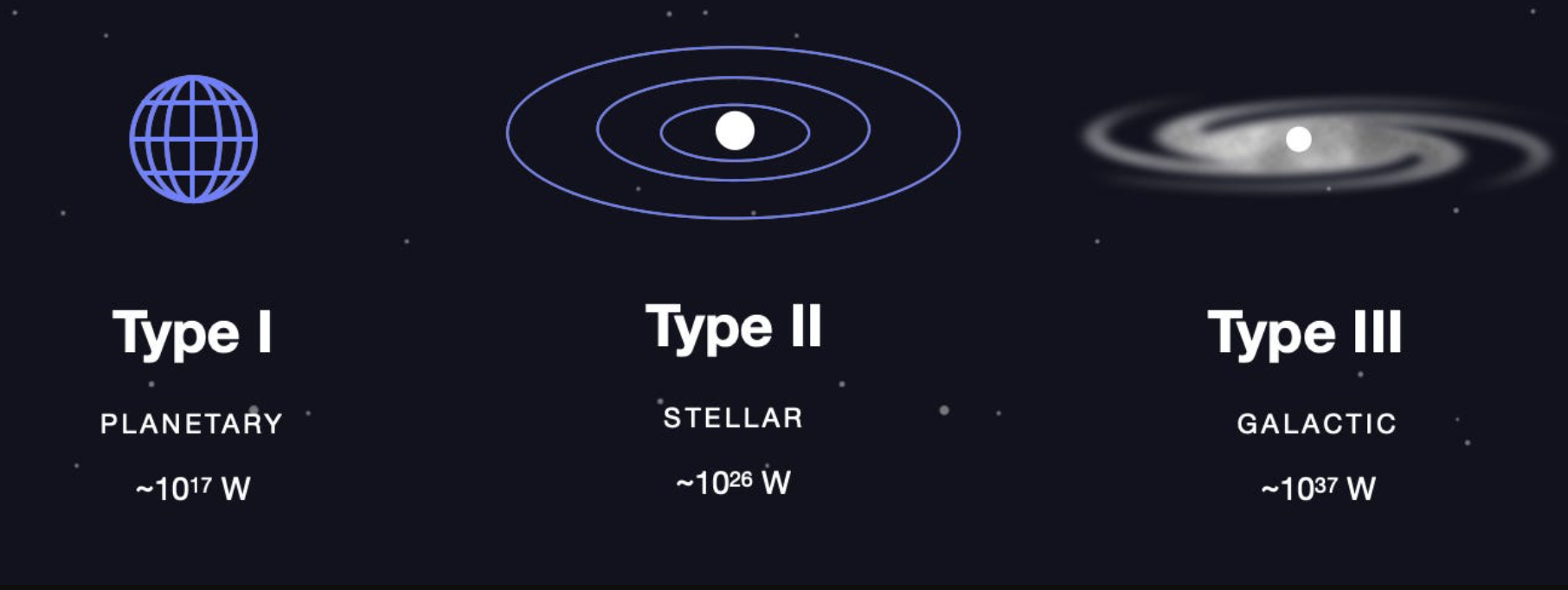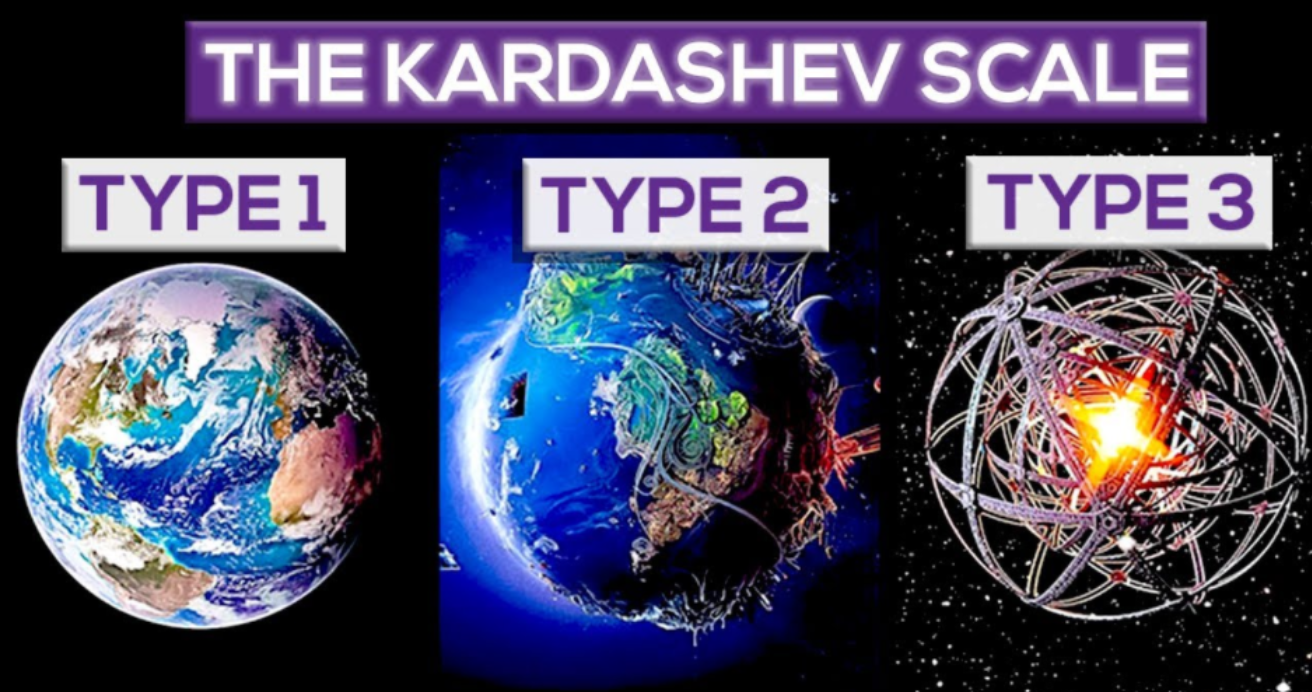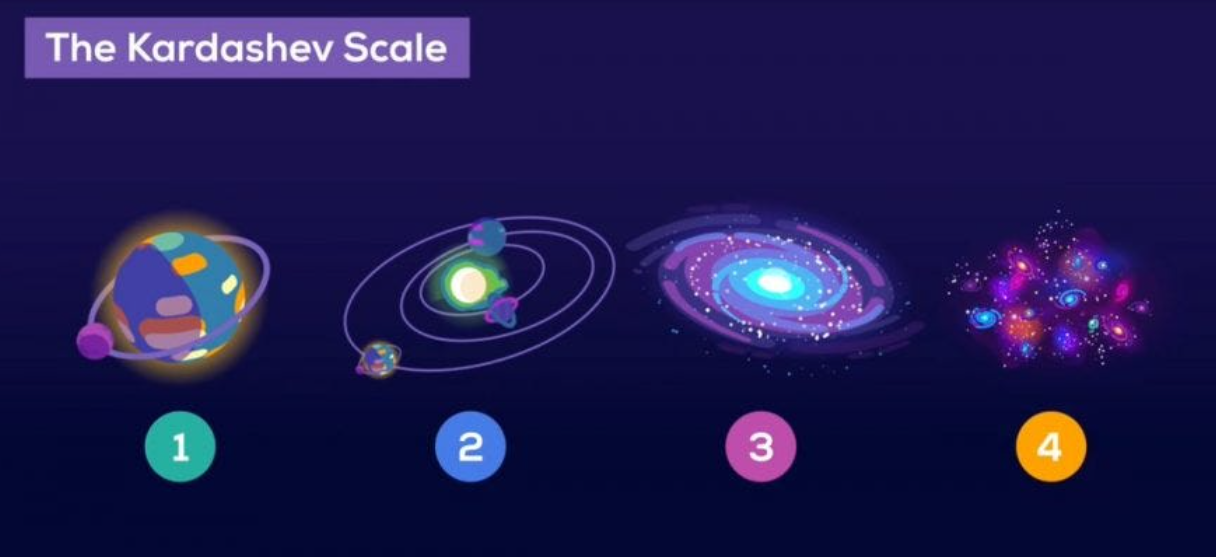The Kardashev Scale, developed by Russian scientist Nikolai Kardashev, is a hypothetical scale that measures a civilization’s level of technological advancement based on the amount of energy it is able to use. The scale initially proposed three levels, but later theories have extended it to include types IV and V. A Type I civilization, also known as a Planetary Civilization, can use and store all of the energy available on its home planet. This includes the energy that reaches the planet from its local star, as well as the energy generated internally by the planet itself.
A Type II civilization, referred to as a Stellar Civilization, can harness the total energy of its star and might utilize it through hypothetical megastructures such as Dyson Spheres. Such a civilization would be capable of stellar manipulations, potentially allowing it to control various aspects of its star, including flares and solar radiation.
Type III, or Galactic Civilization, is significantly more advanced, capable of harnessing the energy from every star within its own galaxy. This would involve an understanding of physics, quantum mechanics, and technology far beyond our current comprehension. It might involve controlling and using dark matter and dark energy, or even the manipulation of space and time itself.

The extension to the scale introduces Type IV and V civilizations. A Type IV civilization, also known as a Universal Civilization, can control energy at the scale of the entire universe. They might be able to tap into the energy of black holes or harness the power of cosmic strings, hypothetical 1-dimensional defects in the universe.
Lastly, a Type V civilization, or a Multiverse Civilization, transcends our own universe. They would have technology capable of manipulating multiple universes, harnessing their energy and resources. Such a civilization would have essentially achieved god-like omnipotence and could even manipulate the fundamental constants of physics.
Though the Kardashev Scale is speculative and highly theoretical, it provides a framework to consider the potential progress of our civilization and others in the cosmos. It forces us to contemplate the future of humanity’s technological evolution and helps guide our understanding of the potential existence and capabilities of extraterrestrial civilizations. As humanity strives for the stars, the scale serves as a roadmap, highlighting the milestones we might hope to achieve in our pursuit of becoming a space-faring civilization.
An Introduction to the Kardashev Scale
The Kardashev Scale is a theoretical system that measures a civilization’s advancement based on the energy it can harness and utilize. Proposed by the Russian astrophysicist Nikolai Kardashev in 1964, the scale classifies civilizations into three types. A Type I civilization, often referred to as a planetary civilization, can effectively manage and use all of the energy available on its home planet. This includes solar, wind, ocean, and geothermal energies, among others. A Type II civilization, or stellar civilization, can harness, control, and use the entire energy of its home star, while a Type III, or galactic civilization, can control the energy of its entire galaxy.
In the context of this scale, our current civilization falls short of even a Type I status, as we are still heavily dependent on fossil fuels and have yet to fully harness sustainable energy sources. The Kardashev Scale is not just a measure of technological advancement but also of societal maturity. It assumes that as civilizations advance technologically, they also advance socially and ethically, becoming more harmonious and less destructive.
While the scale is purely hypothetical and speculative, it serves as a tool for understanding our position in the universe and provides a potential roadmap for future development. It also serves as a framework for discussions on extraterrestrial life, as potential alien civilizations could also be classified using this scale. As such, the Kardashev Scale remains a significant concept in the realm of astrophysics, futurology, and science fiction.

Suggested Reading: Expanding Your Knowledge
Reading is an essential habit to cultivate for anyone interested in expanding their knowledge. It is a powerful tool that promotes personal growth and development by enriching our minds and lives. Suggested reading is often provided by experts, mentors, or educators in various fields to guide individuals towards valuable and relevant information. These recommendations can include diverse genres, spanning from fiction to non-fiction, scientific research papers, historical narratives, biographies, or philosophical discourses.
Suggested reading lists are not limited to academic or professional fields. They can also include topics of personal interest or hobbies such as cooking, gardening, photography, or travel. They can help readers delve deeper into their areas of interest, learn new skills, or broaden their perspectives.
In an age where information is abundant and easily accessible, selecting quality reading materials can be a daunting task. Thus, suggested reading lists play a crucial role in directing individuals towards accurate and beneficial information. They can help filter out unnecessary or misleading content, ensuring that the reader’s time and effort are well-invested.
Moreover, these reading suggestions often come with a brief overview or review of the content, helping potential readers decide whether the material aligns with their learning objectives or interests. This can save time and lead to more effective learning experiences.
To fully benefit from suggested reading, one should approach it with an open mind, ready to challenge their existing knowledge and beliefs. This requires active engagement with the text, including critical thinking and reflection. In this way, reading becomes more than just absorbing information; it becomes a process of exploration, discovery, and personal growth.
In conclusion, suggested reading is a valuable resource for expanding one’s knowledge. It provides direction in the vast landscape of available information, ensuring that our reading habits contribute positively to our intellectual development and personal interests. Whether you’re a professional seeking to update your expertise, a student exploring new fields, or a hobbyist looking to improve your craft, suggested reading can guide your learning journey and enrich your life.

Exploring Extraterrestrial Civilization Concepts
Exploring extraterrestrial civilization concepts is a fascinating topic that has piqued the curiosity of scientists, researchers, and even ordinary individuals for centuries. The concept of life beyond Earth opens up an array of exciting possibilities and questions. For instance, what kind of life forms could exist in other parts of the universe? Would they be similar to humans in physicality and cognition, or would they bear no resemblance to any life form we know?
Theories and hypotheses abound regarding extraterrestrial civilizations. Some propose that alien life forms might be based on biochemistry entirely different from ours, perhaps silicon-based instead of carbon-based. Others speculate about hyper-advanced civilizations that may have mastered technologies beyond our comprehension, such as faster-than-light travel or harnessing the energy of entire galaxies.
The exploration of these concepts also involves considerations about communication with potential extraterrestrial beings. Given the vast distances involved, traditional forms of communication would likely be ineffective. Thus, the search for extraterrestrial intelligence (SETI) includes looking for non-traditional signals, such as electromagnetic emissions or signs of large-scale engineering projects.
Furthermore, the existence of extraterrestrial civilizations raises philosophical and ethical dilemmas. How would the discovery of alien life affect our understanding of our place in the universe? How should we interact with beings that may have a completely different set of values and perspectives?
While these questions remain unanswered, the search for extraterrestrial civilizations continues to drive scientific discovery and technological innovation. As we explore the cosmos, we not only seek to find others but also to understand ourselves better. The quest to discover extraterrestrial civilizations, therefore, is not just about aliens—it’s about us, about understanding our capabilities, our place in the cosmos, and our future as a species.
